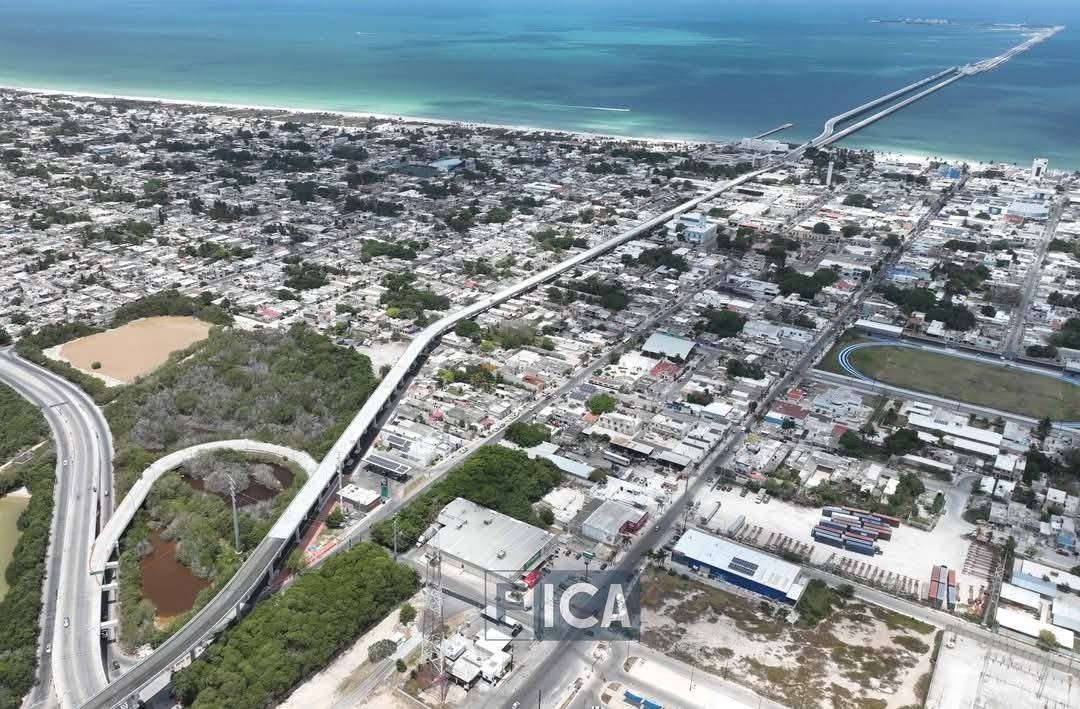Progreso, Yucatán — Business owners, transport operators, and residents are asserting that state authorities must comply with the Land Roads Law by guaranteeing both a toll-free alternate route and free transit without tolls on the viaduct when the alternate route is impassable. The controversy became urgent following an accident on November 13 on 78th and 25th streets, where a trailer truck struck a woman on the alternate route designated for heavy traffic.
Following this incident, the discussion regarding the opening of the viaduct, the extension of its concession, and compliance with the law has intensified.
Legal Mandate for a Free Route
Article 30 of the State of Yucatán's Land Roads Law establishes that state jurisdiction roads can only be built and operated through a concession granted by the Executive branch. This article states that individuals or legal entities require a concession to build and operate land roads and that the state Executive must guarantee the operation of a toll-free alternate route.
Article 36 details the minimum content of the concession title. Among the requirements is that the concessionaire provides guarantees such as free transit without tolls when the alternate route is temporarily impassable. This means that if due to accidents, protests, or other contingencies the alternate route is blocked, the viaduct operator is obligated to allow vehicles to travel without cost on the concessioned highway.
In an interview with El Tiempo, transport operator Luis Martín Alonzo Morales emphasized that the elevated viaduct over 82nd street in Progreso, built and operated by a private company, charges a toll and that, in accordance with Article 30 of the law, the State must guarantee a free alternate route for units not using the viaduct.
The businessman added that Article 36 of the law obligates the concessionaire to allow free passage on the viaduct when the alternate route is impassable. He stated that the current concession does not explicitly mention free tolls in case of contingencies, and therefore it should be modified to include it.
Alonzo also questioned that the concession title was extended from 30 to 40 years without the work having begun operation.
Concession Changes and Project Delays
According to investigations, the concession was extended from 30 to 40 years, and the project cost increased from 1.5 billion to 2 billion pesos, according to the new concession title signed on July 9, 2024. The work was supposed to be completed in January 2025, but workers reported delays.
The completion of construction was confirmed by engineers from Ingenieros Civiles Asociados (ICA), who said in August 2025 that the viaduct was ready and only the vehicle control booth needed to be finished. The engineers indicated that the work would be delivered to the National Port System Administration (Asipona) and that the opening date would depend on that entity.
However, signage at the entrance indicates that it is a "toll road," and no alternate route is signposted.
Accidents Highlight Lack of a Safe Alternate Route
On November 13, 2025, a trailer truck struck a woman at the corner of 78th and 25th streets in Progreso, an area designated since 2024 as an alternate route for the passage of cargo units. According to witnesses, the brutal accident paralyzed traffic, and ambulances took more than half an hour to arrive. Neighbors and merchants denounced that congestion and risk for pedestrians are increasing because trailer trucks are being diverted through residential streets, awaiting the opening of the viaduct.
During that accident, a neighbor protested because the elevated viaduct has not yet opened for the passage of heavy cargo.
In a conference, Governor Joaquín Díaz Mena acknowledged that the viaduct has not opened due to a dispute between the construction company (Grupo ICA) and the National Port System Administration over the rates to be charged.
Reports indicate that to reach the remote terminal, cargo trucks currently travel along 46th and 25th streets. There is no signage indicating a free alternate route, and residents have repeatedly blocked the passage of trailers to demand the opening of the viaduct and an end to heavy traffic through their neighborhoods.
Structural Problem and Legal Basis
The combination of these official and journalistic sources shows that the problem of the alternate route in Progreso is structural. The Land Roads Law of the State of Yucatán not only obligates the State to grant concessions but also guarantees citizens a toll-free alternate route and toll-free access to the viaduct when that route is impassable.
However, the concession title modified in 2024 focuses on extending the term to 40 years and increasing the investment, without public evidence that mechanisms to suspend tolls in case of closures are contemplated. Recent accidents and the use of urban streets as cargo routes demonstrate that the lack of a safe alternate route affects safety and the local economy.
The request from business owners for the concession title to be reviewed and for compliance with Articles 30 and 36 to be guaranteed has legal and social foundation. The Government of Yucatán and the concessionaire company should make the terms of the concession transparent and ensure that, in cases of contingency, the viaduct is accessible free of charge to prevent tragedies and economic losses.
Discover more from Riviera Maya News & Events
Subscribe to get the latest posts sent to your email.
